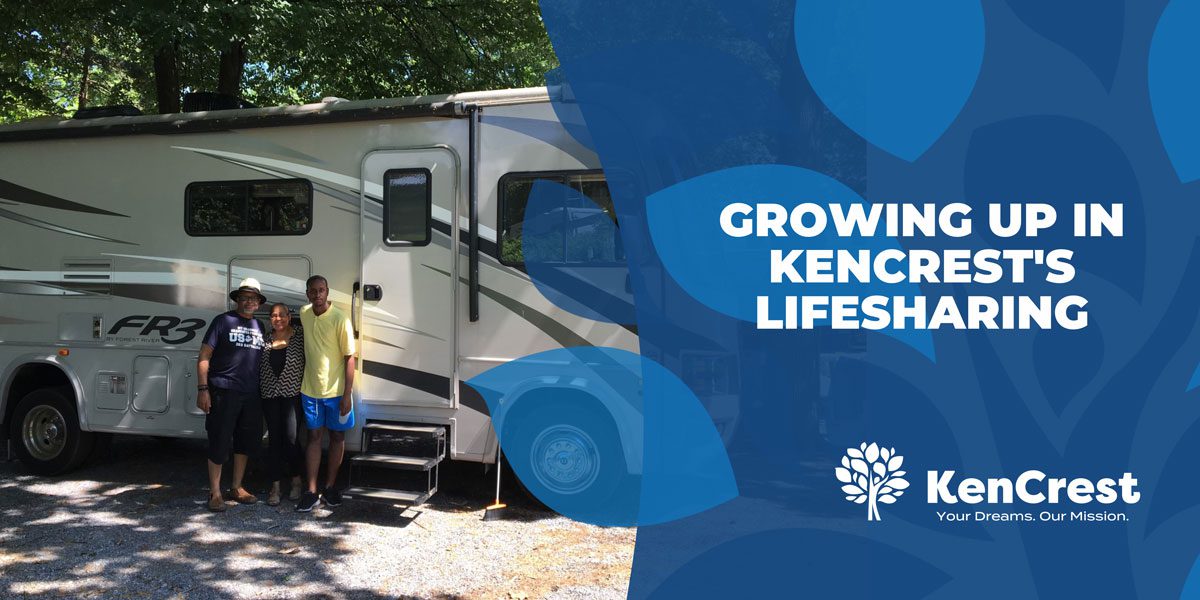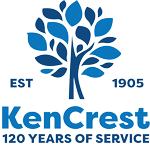
As a scared child, Hakeem Horton joined KenCrest’s Lifesharing program at six but quickly found his forever family.
By Sydney Kerelo
More than 30 years ago, a quiet young boy was given a second chance at a happy family when he was introduced to KenCrest’s Lifesharing program.
At six years old, Hakeem walked into the front doors of Bea Davis’ home looking for a forever home and never looked back. Now, as a 36-year-old man, Hakeem is living a well-rounded, happy life with four siblings and parents that treasure him.
“I tell every coordinator or caseworker that comes to our home that Hakeem is my son,” says Davis. “Don’t come here and treat him like a case because that’s my son.”

Before the Davis family welcomed Hakeem, Bea worked at KenCrest in residential homes. But after two years, she wanted to do something more meaningful by bringing someone with a disability into her home. That’s when she discovered Lifesharing. She came home, talked to her family, and they decided to try it. Little did they know, KenCrest would immediately match them with Hakeem.
“We had an interview, and they said they have a young man who might suit your family,” says Davis. “So, we did respite for the weekend with Hakeem, and afterward, we had a family meeting, and I’ll never forget what my youngest son said to me. He said, ‘Well, Mom, he needs a mom and a dad too.’”
Since that day, Hakeem has been a part of the Davis family, growing up alongside his four siblings in a home filled with love and affection. But it didn’t come without complications.
Hakeem previously lived with his biological family before coming to Davis, and he developed behavior problems where he didn’t know how to bathe himself, wouldn’t speak or communicate, and would have tantrums out of frustration.
At the time, Hakeem would refuse to bathe or sit in the tub without the inclination to get out. This left Davis bewildered, not knowing how to help him. But luckily, Davis’ daughter was studying to become a teacher working in special education and was able to provide tips to help Hakeem. They began using a timer for when he took his baths to let him know when it was time to leave the tub and practiced new techniques to help him learn to communicate and speak.
“When he first came to us, they were teaching him sign language because they didn’t think he could speak,” says Davis. “But one day, I was having breakfast, and Hakeem was eating Rice Krispies and was having a full conversation. He didn’t know I was standing behind him, and that was the first time I heard him speak.”
“Typically, he would point to what he wanted; if he wanted juice, he would point to it. But eventually, we began teaching him to say juice, and then we would wait to give it to him until he tried to say the word,” adds Davis. “That’s how we encouraged him to talk, and then he realized he gets what he wants when he speaks it.”

Now, Hakeem is a social butterfly, constantly talking, chatting with people, or singing. As a child, he joined the Joy Unlimited Youth Mass Choir, where he sang with dozens of other kids and young adults. John B. Samuel, the founder of Joy Unlimited, and several choir members worked closely with Hakeem to help him memorize the songs.
He even volunteers at the REID Foundation—a nonprofit organization that utilizes the healing power of music to bring “front-line therapy” and prevention to those impacted by substance abuse, mental health issues, or life crisis. When there, he packs up the food, breaks down boxes, tends to tables, and more. They even gave him two “helping awards” for his dedication to the organization to appreciate his service.
Alongside his incredible singing abilities, Hakeem works four days a week at APS (Associated Production Services) Warehouse. But before that, he worked security for the karate school and was even an usher at their local church. He even plans the family’s vacations each year. One year he wanted to learn to ski, so he made the family take a trip to the slopes.
“I never put him in a box, and I never will. I always say do you want to climb Mt. Everest? You can; nothing is holding you back but yourself,” she adds. “If you want to do it, you can do it.”
Want to learn more about KenCrest’s Lifesharing program? Click the links below!
